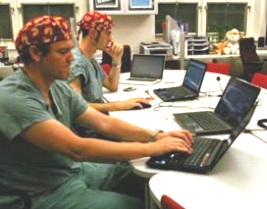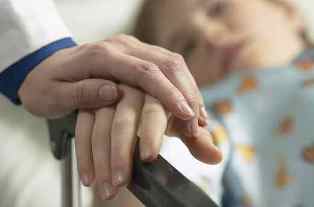
September 18th, 2010 by Medgadget in Better Health Network, News, Research
Tags: Anesthesiology, General Surgery, Italy, McGill-McGill University Health Centre, Montreal, Pisa, Preoperative Assessment At Home Via Teleconference, Remoted-Performed Surgery, Surgery Via Teleconference, Surgery Videoconferencing, Teleanesthesia, Thyroid Gland Surgery, Transcontinental Anesthesia
No Comments »

 Just two weeks after we reported on teleanesthesia in the form of remotely-performed nerve blocks, the first report of transcontinental anesthesia comes in.
Just two weeks after we reported on teleanesthesia in the form of remotely-performed nerve blocks, the first report of transcontinental anesthesia comes in.
On August 30, anesthesiologists of McGill-McGill University Health Centre in Montreal, kept watch over a patient in Pisa, Italy, undergoing thyroid gland surgery. Basically they used a teleconferencing setup with four cameras, with two cameras streaming the anesthesia data (ventilation parameters and vital signs), one camera aimed at the operating field, and the last one for any special purposes. Read more »
*This blog post was originally published at Medgadget*
September 18th, 2010 by John Mandrola, M.D. in Better Health Network, Health Policy, News, Opinion
Tags: American Diet, Cardiology, Diet and Nutrition, Diet and Weight, Dietetics, Doctors Who Blame Fast Food, Fatness, Food and Nutrition, General Medicine, Heart Disease, McDonald's, Obesity Epidemic, Overweight, Physicians Committee for Responsible Medicine, TV Ads By Doctors
No Comments »

 I’m trying to get off the topic of fatness, but just when it seems right to move on to something less hopeless, we hear that even doctors can be felled by obesity’s resilience.
I’m trying to get off the topic of fatness, but just when it seems right to move on to something less hopeless, we hear that even doctors can be felled by obesity’s resilience.
To the Physicians Committee for Responsible Medicine, a group of well-meaning doctors who are buying expensive TV ads blaming McDonald’s for heart disease, I have just 5 words: McDonald’s is not the problem! Gosh. It’s maddening to think that such smart people could be that misguided — a whole committee of doctors completely devoid of any master-of-the-obvious is hard to fathom.
Don’t misunderstand — I’m not advocating McDonald’s food as overly nutritional, but blaming MacD’s for our obesity epidemic is like blaming guns for violence (for the record, guns scare me), brew pubs for alcoholism, or religion for war. (Sorry, that last one is a bad example.) Read more »
*This blog post was originally published at Dr John M*
September 18th, 2010 by Toni Brayer, M.D. in Better Health Network, Health Policy, News, Opinion, Research
Tags: Art of Medicine, Comforting a Patient, Dehumanization, Doctor's Hug, Emotional Component, Emotional Support, Emotional Time, General Medicine, Hand Holding, Holding a Patient's Hand, Holding Hands, Hugging, Human Compassion, Human Touch and Medicine, Lay On Hands
No Comments »

 The New York Times asks: “Should the doctor hold a patient’s hand” during emotional times? The comments that follow the short article are the most interesting. Most readers say this question shouldn’t even be asked and that human compassion should always win out. Touch is a human gesture of comfort and understanding.
The New York Times asks: “Should the doctor hold a patient’s hand” during emotional times? The comments that follow the short article are the most interesting. Most readers say this question shouldn’t even be asked and that human compassion should always win out. Touch is a human gesture of comfort and understanding.
But some readers disagree. One said she recoiled when the doctor reached out to touch her hand after telling her that her cancer had returned. It felt really creepy to her. Another asked: “What if the physician is also a Catholic priest or a pediatrician and a priest?” Whoa. It becomes more complex when you get into the psyche of the abused.
I have often thought that one of the appeals of chiropractors is that they “lay on hands” and touch and manipulate patients. With 21st century modern medicine, physicians can treat entire episodes of illness with tests, scans and robots and never actually touch the patient. No wonder people feel “dehumanized” and wonder if doctors really care. Touch and compassion are part of the entire human experience and the physician is present during a patient’s most stressful time. But wait, there’s another side. Read more »
*This blog post was originally published at EverythingHealth*
September 17th, 2010 by RyanDuBosar in Better Health Network, News, Research
Tags: Ambulatory Care, Archives of Internal Medicine, Change Doctors, Doctor-Patient Communication, Family Medicine, Finding A New Doctor, General Medicine, Medical Errors, Medical Mistakes, Mistakes In Patient Care, Normal Diagnostic Challenges, Normal Therapeutic Challenges, North Carolina, Patient Expectations, Patient Safety, Patient-Doctor Confrontation, Patient-Doctor Relationship, Picking A Better Doctor, Primary Care, Reuters Health, Switch Doctors, Wrong Diagnosis, Wrong Treatment
No Comments »

Patients won’t confront doctors if they think there’s been a mistake. They’ll just find a new doctor, even if there’d been no medical error.
Researchers looked at adult visits to seven primary care practices in North Carolina during 2008. They asked patients about their perceptions of medical mistakes and how did it influence the choice to switch doctors.
Of 1,697 patients, 265 (15.6 percent) reported a mistake had been made, 227 (13.4 percent) reported a wrong diagnosis, 212 (12.5 percent) reported a wrong treatment, and 239 (14.1 percent) reported changing doctors as a result. Results appeared in the Archives of Internal Medicine.
But anecdotes cited by patients as mistakes were often normal diagnostic or therapeutic challenges. A typical scenario might be the patient reported symptoms, the doctor did not correctly diagnose it at first presentation, and a specialist or second physician offered a specific diagnosis. Other scenarios included medication trials or side effects from the prescription. Read more »
*This blog post was originally published at ACP Internist*
September 17th, 2010 by DavedeBronkart in Better Health Network, Health Tips, News, Opinion
Tags: A Good Doctor, e-Patients.net, ePatient Dave, Family Medicine, Female Doctor, General Medicine, Internal Medicine, Medical Credentials, National Public Radio, NPR, Picking A Better Doctor, Primary Care, Scott Hensley, U.S. Medical Residencies, U.S. Medical Schools, What Makes A Slightly Better Doctor
No Comments »

On Monday, NPR’s Scott Hensley posted:
“Between the Internet and all the data insurance companies and the government collect on doctors, you’d think it would be a lot easier than it used to be to find a good one. But it’s not.”
Sound familiar around here? See his thoughts: “3 Tips For Picking A Slightly Better Doctor.”
(Thanks to friend Cindy Johnson for the tip.)
*This blog post was originally published at e-Patients.net*
 Just two weeks after we reported on teleanesthesia in the form of remotely-performed nerve blocks, the first report of transcontinental anesthesia comes in.
Just two weeks after we reported on teleanesthesia in the form of remotely-performed nerve blocks, the first report of transcontinental anesthesia comes in.




 I’m trying to get off the topic of fatness, but just when it seems right to move on to something less hopeless, we hear that even doctors can be felled by obesity’s resilience.
I’m trying to get off the topic of fatness, but just when it seems right to move on to something less hopeless, we hear that even doctors can be felled by obesity’s resilience.
 The New York Times asks: “Should the doctor hold a patient’s hand” during emotional times? The comments that follow the
The New York Times asks: “Should the doctor hold a patient’s hand” during emotional times? The comments that follow the 









